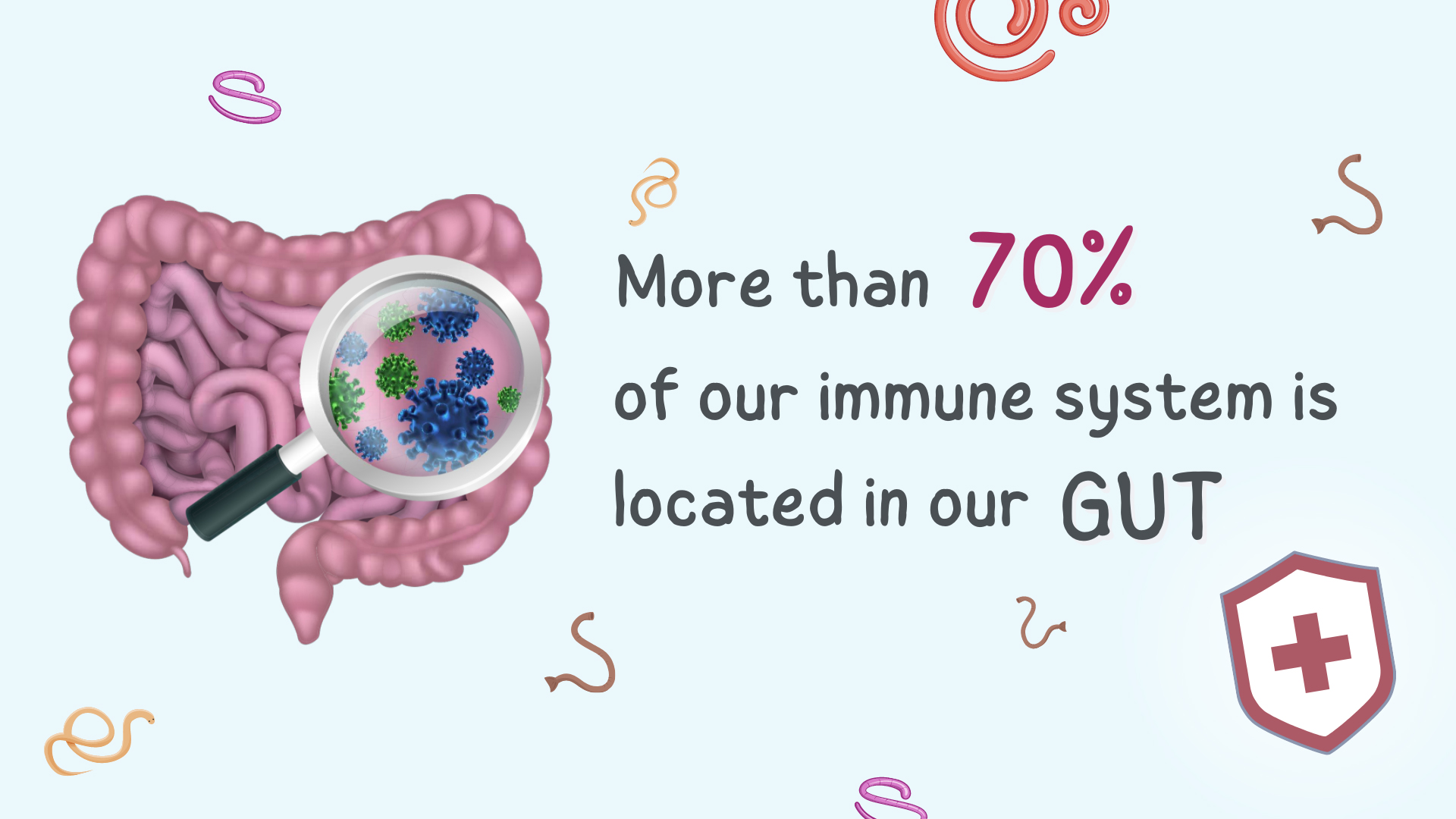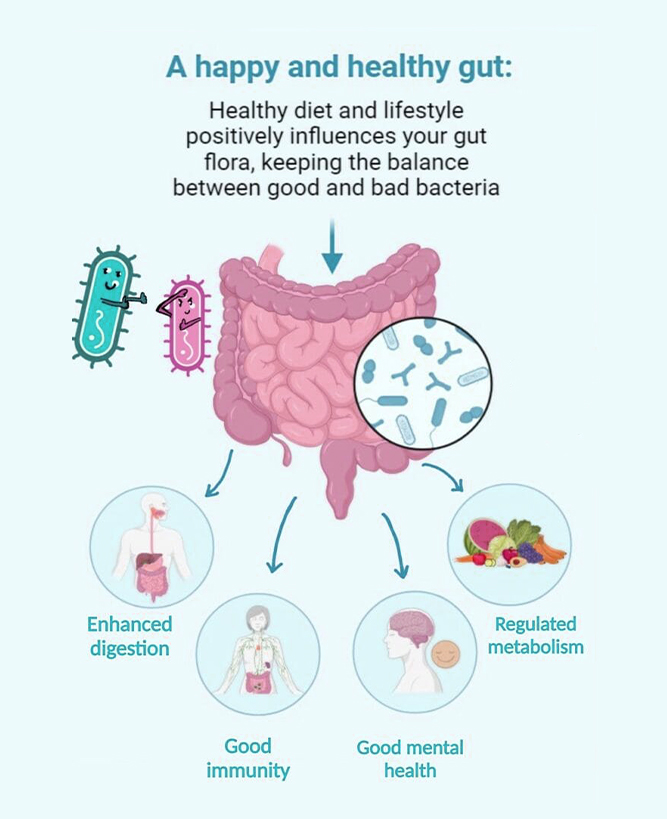The Key to a Happier, Healthier You - Gut Health
Gut health has become a major topic in recent years as new research reveals its deep influence on overall wellbeing. Often called the “second brain,” the gut is connected to the brain through a complex network of nerves and chemical signals, affecting mood, cognition, and even behaviour. This connection, known as the gut-brain axis, means that what happens in your digestive system can influence your mental health just as much as your physical health.
The growing interest in gut health stems from discoveries about the gut microbiome, the trillions of bacteria, viruses, and other microorganisms living in your digestive tract. These tiny residents play an essential role in breaking down food, absorbing nutrients, supporting the immune system, and protecting against harmful pathogens. They also produce important chemicals and neurotransmitters that can impact everything from how you feel to how your body functions. Because of these wide-ranging effects, keeping your gut healthy is now seen as a foundation for good health overall. From digestion and immunity to mood and energy levels, a well-balanced gut can make a real difference in how you feel every day.
In this blog, we’ll dive deep into the importance of gut health, how to recognise when it’s out of balance, and the steps you can take to support it naturally.
Signs Your Gut Health Might Be Out of Balance
If you’ve ever experienced bloating, gas, or an upset stomach, your gut could be trying to tell you something. Here are a few signs that your gut health might need attention:
- Digestive Issues
Frequent bloating, constipation, diarrhoea, or heartburn can be signs of an unhealthy gut. If these issues become chronic, it’s a good idea to consult a healthcare provider. - Low Energy Levels
A poor gut microbiome can lead to inflammation, which affects energy production. If you feel tired all the time, your gut health could be a contributing factor. - Frequent Illnesses
As much as 70% of your immune system is located in your gut. If your immune system is compromised, it can lead to more frequent infections, colds, or illnesses. - Skin Problems
Conditions like eczema, psoriasis, acne, or rosacea have been linked to gut health. If you’re struggling with skin issues, it might be time to consider the state of your gut microbiome. - Mental Health Symptoms
About 90% of the body’s total serotonin is produced in the gut. This neurotransmitter plays a vital role in regulating mood, digestion, and overall well being. An imbalance in the gut microbiome can disrupt serotonin production, potentially leading to symptoms such as anxiety, depression, and brain fog.
The Connection Between Your Gut and Overall Health
1. Digestion and Nutrient Absorption
Your gut’s primary role is to digest food, absorb nutrients, and eliminate waste. It hosts a diverse community of healthy bacteria, fungi, and other microorganisms that are essential for these functions. These beneficial microbes support digestion, enhance nutrient absorption, and contribute to your overall health. Maintaining a balanced gut microbiome is key to keeping your digestive system working smoothly and efficiently.
A healthy gut ensures that the food you eat is properly digested, and the nutrients are efficiently absorbed into your bloodstream. This is key for sustaining your energy and overall health.
2. Immune System Support
Did you know that around 70% of your immune system is housed in your gut? A healthy gut helps to regulate your immune system by distinguishing between harmful invaders and harmless substances. When your gut is healthy, your immune system can function properly, helping you fight off infections and stay well.
On the other hand, an unhealthy gut can lead to a weakened immune response, making you more prone to illnesses.
3. Mental Health and Wellbeing
The gut-brain connection is one of the most exciting areas of research. Scientists are discovering how the gut plays an important role in regulating mood, stress levels, and even cognitive function. About 90% of serotonin (the “feel-good” hormone) is produced in the gut, and an imbalanced gut microbiome has been linked to mental health conditions like depression, anxiety, and brain fog.
When your gut is out of sync, it can negatively affect your mood, energy, and mental clarity. The good news? Supporting your gut health can help balance your mood and mental clarity.
4. Skin Health
Your gut doesn’t just affect your internal health; it also has a big impact on your skin. Conditions like acne, eczema, psoriasis and rosacea are often linked to inflammation in the gut. When your gut is inflamed or unhealthy, it can manifest in skin breakouts and irritation. A balanced gut microbiome helps to keep inflammation in check, leading to healthier, clearer skin.
How to Improve Gut Health Naturally
Supporting your gut health doesn’t have to be complicated or expensive. There are several simple and natural ways you can nurture your gut and get it back into balance:
1. Eat a Fibre-Rich Diet
Fibre is your gut’s best friend. Foods rich in fibre, such as fruits, vegetables, whole grains, and legumes, feed the healthy bacteria in your gut. Fibre helps keep things moving through your digestive system, reducing constipation and promoting regular bowel movements.
2. Incorporate Fermented Foods
Fermented foods like yoghurt, kefir, sauerkraut, and kimchi are rich in probiotics—beneficial bacteria that support a healthy gut. Including these foods in your diet can help replenish your gut’s healthy bacteria, improving digestion and overall gut health.
3. Cut Back on Processed Foods
Highly processed foods, especially those high in sugar and refined carbs, can disrupt your gut microbiome. Reducing your intake of sugary snacks, processed meats, and artificial sweeteners will allow your gut’s healthy bacteria to thrive.
4. Stay Hydrated
Water is essential for good digestion. It helps to soften stools and promote regular bowel movements. Drinking enough water also supports the production of mucus, which is essential for maintaining the health of your gut lining.
5. Manage Stress
Chronic stress is one of the biggest contributors to gut imbalance. When you’re stressed, your body releases stress hormones that can disrupt digestion and lead to gut issues like bloating, gas, and irregular bowel movements. Practising stress-reducing activities like yoga, meditation, or simply taking time out for yourself can help support your gut health.
6. Get Plenty of Sleep
Your gut needs rest too. Poor sleep can negatively impact your gut health, leading to issues like inflammation and digestive discomfort. 7–9 hours of quality sleep each night can help to recover your body and your gut health.
7. Consider Probiotics or Prebiotics
Probiotics are live beneficial bacteria, while prebiotics are compounds that feed these good bacteria. Taking high-quality probiotics or incorporating prebiotic-rich foods (like garlic, onions, and bananas) into your diet can support gut health, particularly after antibiotic use.
The Link Between Gut Health and Overall Wellness
Rather than chasing after quick fixes like detox teas or trendy supplements, real gut health comes from building steady, consistent habits over time. Think of it as supporting your body in the way it’s designed to function, every day.
When your gut is in balance and working well, you may notice benefits like:
- Better digestion: less bloating, more regular bowel movements, and easier absorption of nutrients.
- Stronger immunity: since most of your immune system lives in the gut, a healthy microbiome helps you fight off illness more effectively.
- Improved mental health: thanks to the gut-brain connection, good gut health supports mood, reduces anxiety, and boosts focus.
- Balanced hormones: the gut helps regulate hormones like insulin, cortisol, and even oestrogen, which affect your mood, weight, and energy.
- Clearer skin: skin issues like acne, eczema, or dullness are often linked to poor digestion or inflammation originating in the gut.
- More energy: when your body absorbs nutrients properly and isn’t fighting off inflammation, your energy levels naturally improve.
- Reduced inflammation: a healthy gut can help lower chronic inflammation, which is linked to many long-term conditions like arthritis and heart disease.
A Healthy Gut Equals a Healthy You

Your gut is the foundation of your health, and taking care of it can have a profound effect on your overall well being. With the right diet, lifestyle, and support, you can keep your gut healthy and functioning optimally.
By understanding the importance of gut health and incorporating simple, effective changes into your daily routine, you’re investing in a healthier, happier, and more energetic future.
FAQs
Gut health impacts digestion, immunity, mental health, and overall wellness. A balanced gut microbiome supports a healthy body and mind.

